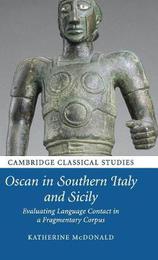
|
Oscan in Southern Italy and Sicily: Evaluating Language Contact in a Fragmentary Corpus
Hardback
Main Details
| Title |
Oscan in Southern Italy and Sicily: Evaluating Language Contact in a Fragmentary Corpus
|
| Authors and Contributors |
By (author) Katherine McDonald
|
| Series | Cambridge Classical Studies |
|---|
| Physical Properties |
| Format:Hardback | | Pages:325 | | Dimensions(mm): Height 223,Width 147 |
|
| Category/Genre | Historical and comparative linguistics |
|---|
| ISBN/Barcode |
9781107103832
|
| Classifications | Dewey:937.02 |
|---|
| Audience | | Professional & Vocational | |
|---|
| Illustrations |
28 Tables, black and white; 4 Maps; 15 Halftones, unspecified; 15 Halftones, black and white; 11 Line drawings, black and white
|
|
Publishing Details |
| Publisher |
Cambridge University Press
|
| Imprint |
Cambridge University Press
|
| Publication Date |
1 October 2015 |
| Publication Country |
United Kingdom
|
Description
In pre-Roman Italy and Sicily, dozens of languages and writing systems competed and interacted, and bilingualism was the norm. Using frameworks from epigraphy, archaeology and the sociolinguistics of language contact, this book explores the relationship between Greek and Oscan, two of the most widely spoken languages in the south of the peninsula. Dr McDonald undertakes a new analysis of the entire corpus of South Oscan texts written in Lucania, Bruttium and Messana, including dedications, curse tablets, laws, funerary texts and graffiti. She demonstrates that genre and domain are critical to understanding where and when Greek was used within Oscan-speaking communities, and how ancient bilinguals exploited the social meaning of their languages in their writing. This book also offers a cutting-edge example of how to build the fullest possible picture of bilingualism in fragmentary languages across the ancient world.
Author Biography
Katherine McDonald is Research Fellow in Classics at Gonville and Caius College, Cambridge, and an affiliated postdoctoral researcher on the AHRC-funded project 'Greek in Italy'. Her current research interests include the Italic languages, ancient bilingualism, personal names, and gender linguistics.
Reviews'This volume is the first thorough study on the interaction between Oscan and Greek based on the written evidence, but it can also be regarded as an up-to-date collection of the South Oscan inscriptions ... We believe that this book will be a reference work for anyone interested either in South Oscan epigraphy or in language contact phenomena of the ancient world.' Manuela Anelli, Ancient History Bulletin
|